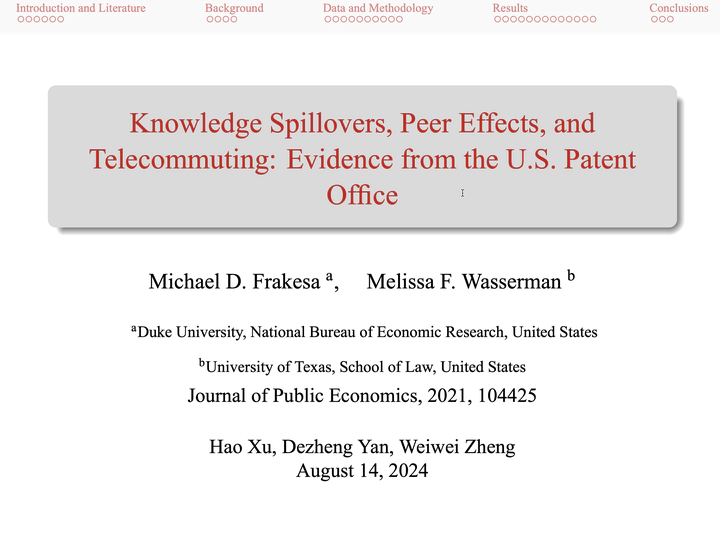Knowledge Spillovers, Peer Effects, and Telecommuting: Evidence from the U.S. Patent Office
 Title Page: Journal of Public Economics
Title Page: Journal of Public EconomicsAbstract
We find strong evidence of peer influence in granting behaviors among patent examiners. In the face of a one standard-deviation increase in the inherent grant rate of her peers, an examiner in her first two years at the Patent Office will experience a 0.15 standard-deviation increase in her own grant rate. Moreover, we document a number of markers suggesting that such influences arise, in part, through knowledge spillovers, as distinct from peer-pressure mechanisms. Finally, drawing on variations in peer proximity due to the onset of telecommuting—both with respect to peer and focal examiner telecommuting experiences—we document evidence that examiner peer influences and knowledge flows are stronger when examiners work at the Patent Office, as opposed to working from home.
Knowledge spillovers have been central to many models of economic growth and technological change (Krugman, 1991; Romer, 1986; Lucas, 1988). While much of the theoretical and empirical discussions surrounding knowledge spillovers have focused on knowledge transmission across firms or geographical units (Audretsch and Feldman, 2004), knowledge transmissions within firms may also contribute significantly to these same macroeconomic outcomes, in addition to the productivity outcomes of individual firms (Jackson and Bruegmann, 2009). Though our analysis focuses on just one setting—the U.S. Patent Office—our findings demonstrate just how strong of a role that peers can play in administrative agencies (and in high skilled work settings), even when focusing on tasks that are somewhat isolated and non-teambased in nature.
Citation: Frakes, M. D., & Wasserman, M. F. (2021). Knowledge spillovers, peer effects, and telecommuting: Evidence from the u.s. Patent office. Journal of Public Economics, 198, 104425. http://doi.org/10.1016/j.jpubeco.2021.104425.